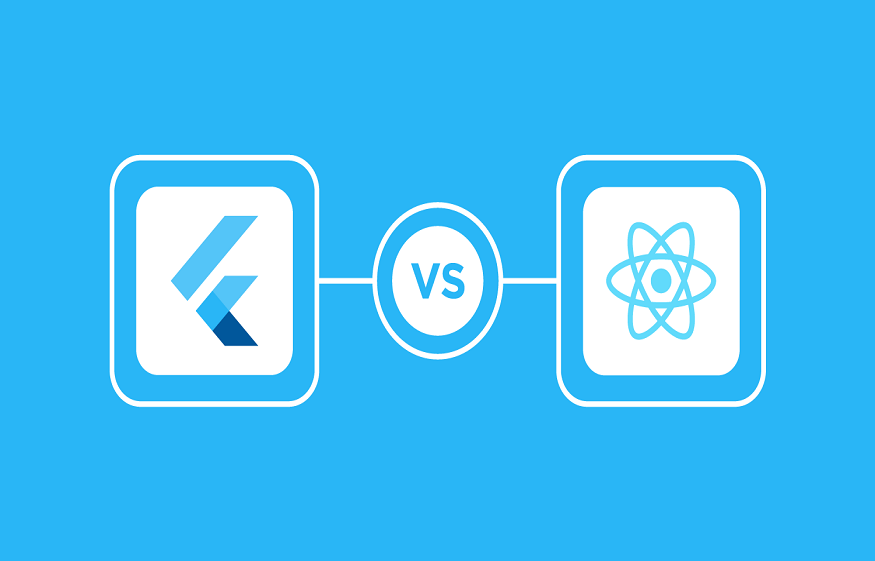Flutter vs React Native. Which is better?

Flutter vs React Native
As more and more people are embracing the latest technology. The demand for mobile applications has increased greatly. To keep up with the growing needs of customers and businesses, the constant entry of niche technology, frameworks and platforms becomes a necessity.
To develop a new mobile application for the new business segment. Developers need robust technology that makes coding time simple and efficient. To achieve this, many developers have started using the cross-platform application. So they can take advantage of its features to design e-commerce applications, interactive applications, and social applications.
Flutter and React Native are the two main development frameworks competing to prove their worth and which are the hosts of cross-platform mobile app development.
Facebook introduced React Native and in no time the framework gained popularity and the companies that used it benefited greatly. React Native is known as the future of hybrid applications .
User interface
When it comes to a user interface of an application and the creation of the block component. You will find a big gap between React Native and Flutter. React Native is based on native components, while Flutter works flawlessly with proprietary widget sets, proprietary widgets are quite cool and best for a custom UI design that will provide dynamism and native support.
Having said that. There are some drawbacks where the app is missing some components, compromising the user experience. React Native takes all the credit for being the most dynamic framework that improves the user experience.
You can also use React templates to get better results in terms of time efficiency and design. You can use React Dashboard to get better user experience.
Time of development
React Native has remained one of the most trusted frameworks for developing a next generation mobile app. It is preferred by the developer tribe due to its efficiency and reduces the time frame for development, plus it adds to the user interface and takes less time to develop the project.
In the comparison between Flutter and React Native, Flutter takes longer to develop. React Native’s ready-to-use components make the development process simple and fast, thus increasing the scope of mobile app development without disturbing developers. Flutter promises high-quality ease of use, however the development framework calls for more recognition over React Native.
Performance
Native performance mapping is the best way to identify which framework is ideal for mobile app development. The reason Flutter vs React Native stays ahead of other frameworks is because of the Dart framework. Also, the JavaScript layer helps them to easily connect with native components.
Alternatively. React Native has a larger following and community , yet developers are aware of the pain they face when it comes to building hybrid apps. However, native applications fit these requirements exceptionally well. According to the framework, developers will not face any problems while developing an application in a native environment.
Developers sometimes run into issues while running the React Native hybrid application architecture. Whereas Flutter makes it easy for developers as they can reuse existing code. The C ++ engine works flawlessly and supports the language. For which Flutter gains appreciation here.
Stability
Stability is one of the important aspects for companies that expect a flawless mobile application. When we compare React Native vs Flutter, the competition seems very tough. The Alpha version of Flutter left it a step behind, as it is not recommended for large projects.
Read more: Robust Dedicated Servers for Business at Cheap Prices | Onlive Server
The new version of Flutter beta 2, recently released. It offers some awesome features for developers. The great community support for React Native and its consistency since its inception has made it more popular and a reliable framework. React Native. A framework that is already established and appreciated for its features and reliability in the industry where Flutter is still struggling to make a mark. Hence, React Native is a clear winner here.
Customer base
React Native needs no introduction these days . It was, and it ranks among the most promising mobile app development framework for developers. The frame can carry out the project of any size.
Flutter, which was released a few years ago. It is still struggling to make its presence felt in the industry. Since the frame is new to the market. It will take you some time to build a foundation and be recognized in the market.
Documentation and Toolkit
Processing documentation is very complex and time-consuming. However, Flutter is very good at making documentation easier, it makes the life of the mobile app developer easier by allowing them to use it while documenting their apps. So when it comes to documentation and the Toolkit, Flutter is the best choice.
Conclusion
Thus. We have listed a detailed comparison of both frameworks that are popular with startups for mobile app development. Both frameworks have their own positive points in terms of stability, performance, documentation, and other aspects as mentioned above.
So. It is very difficult to determine which is the winner. Since both have their pros and cons. But I can say that since Flutter is a new framework. It will take longer to stabilize in the industry compared to React Native.
Flutter’s capabilities are not questioned because it helps create beautiful mobile apps and helps start-ups start earning in no time. Flutter has a long way to go and an impressive future.







